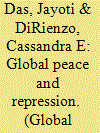| Srl | Item |
| 1 |
ID:
169167


|
|
|
|
|
| Summary/Abstract |
The global community continues to endure violent attacks that seem to continuously morph in nature. The complexities of violence in today's world make it imperative to examine factors that can counter these acts of terror. The primary focus of this paper is to explore the relationship between the number of women in government on levels of corruption and country-level peace. It is argued that the percentage of women in government has a causal effect on peace through the focus on societal needs in addition to an indirect effect through a reduction in corruption. This, in turn, enhances both peace and peacebuilding. Using cross-country data, the effects of women in government on peace are tested using a mediation analysis. As a preview of the empirical results, the indirect effect is found to be statistically significant and stronger than the direct effect once the level of corruption is controlled.
|
|
|
|
|
|
|
|
|
|
|
|
|
|
|
|
| 2 |
ID:
112798


|
|
|
|
|
| Publication |
2012.
|
| Summary/Abstract |
Past research and historical events suggest that the relationship between the peacefulness of a country and the degree of political and civil liberties afforded to its citizens has an inverted U-shape relationship such that the greatest unrest is observed at an intermediate level of freedom. Using the Global Peace Index (GPI), developed by the Institute for Economics and Peace (2010) in collaboration with the Economist Intelligence Unit, this study empirically tests this relationship and the results offer support for this nonlinear relationship. It is argued that while highly repressed societies experience a 'controlled' peace, highly free societies also experience peace stemming from the basic freedoms such as the right to expression and assembly and participation in policy creation. Alternatively, when political and civil freedoms are at some intermediate level, the freedoms offered may not be strong enough to serve as a substitute for protest, yielding greater conflict, crime, and less peace. Policy implications of the findings are also offered.
|
|
|
|
|
|
|
|
|
|
|
|
|
|
|
|
| 3 |
ID:
186000


|
|
|
|
|
| Summary/Abstract |
The COVID-19 global pandemic has had a devastating impact on economies and could lead to a surge in shadow or informal economic activity. Perhaps more than ever it is imperative to understand the nature and drivers of shadow economies. The primary focus of this analysis is to reexamine the relationship between corruption and shadow economies by extending previous research to consider a possible moderating effect between economic development and corruption on shadow economies. It is hypothesised that the effect of corruption on the shadow economy will vary with the level of economic development, with corruption having the strongest positive effect in low income countries, but this effect will be mitigated as the level of economic development increases. We find empirical evidence to support this hypothesis using multiple data measures of country corruption and the size of the shadow economy. Policy implications are offered based on the empirical results.
|
|
|
|
|
|
|
|
|
|
|
|
|
|
|
|